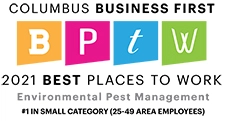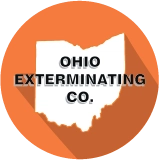How To Choose a Pest Control Company
The first step is choosing the right pest control company for the job. Things you might consider include licensing and qualifications, treatment methods, years of experience, customer reviews, and cost.
Below, we dive into detail on each of these factors.
Does the company have a valid license and permits to perform pest control?
According to the United States Environmental Protection Agency (EPA), all pesticide applicators and their supervisors need to be licensed at the state level. The EPA has established minimum standards of competency, and the Ohio regulatory agencies take care of the granting, maintaining, and revoking of licenses.
Is the company a member of any professional organizations?
Pest control companies have the option to obtain certifications from trade organizations like QualityPro. While not required, they can help you assess the quality of a company's products. For example, the GreenPro Service Certification indicates comprehensive and effective pest control treatment that is safer for humans and the environment.
Pest control experts can also obtain membership in professional organizations. Companies can obtain membership in the National Pest Management Association (NPMA), or state-level organizations. NPMA membership provides companies with access to resources, education, and a network of other pest professionals. While not mandatory, membership in professional organizations helps back up a company's reputability.
Professional Experience and Specialties
You can get some insight into a company's level of pest management experience by seeing how long it has been in business. Local reviews and the company's own website can also let you know whether the company has the experience needed to deal with the specific species of pests invading your home. You can contact a representative directly to learn this information if you can't find it online.
Reviews and Recommendations
Resources you can use to check a company's reputation include the Better Business Bureau (BBB), local review sites, and social media. You can also check the status of a company's license via the Ohio licensing board.
Cost of Services and Guarantees
Things like the size of your house, your location, the type of pest being treated, and other factors can all affect the price of pest control.
You can learn whether a company offers free on-site estimates (to determine if it fits in your budget), as well as what kind of guarantees it offers. Often, a company will guarantee that if it does not take care of your pest problem, it will keep coming back until it does.
Safety and Treatment Methods
It's important to consider safety when deciding on a pest control professional, and you might prefer a provider who uses more natural, environmentally friendly treatment methods.
Safety
Your pest control expert should use pesticides that are low toxicity or non-toxic any time they can. If any pesticides used don't fit into one of these categories, your technician should explain what safety precautions they plan to use to protect your family, your pets, and you. Any pesticides that pose more than a minimum risk are required to be registered with the EPA.
Treatment Methods
Companies looking to reduce their use of chemical pesticides often follow practices such as Integrated Pest Management (IPM). Using IPM involves a series of steps:
- Figure out what pests are causing the problem and determine whether immediate action is needed.
- Determine the best and safest course of action.
- Use a combination of biological, cultural, mechanical, and physical controls to manage the pest problem.
- Use chemical controls only if needed, and always with other controls for effective long-term pest management.
- Assess the outcome and continue with additional pest control as needed.
















